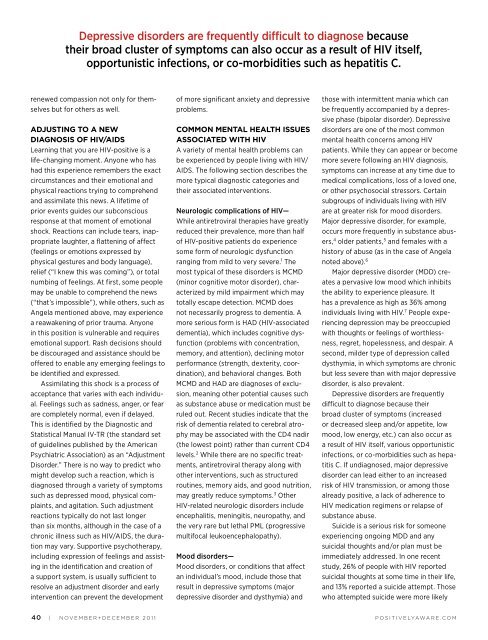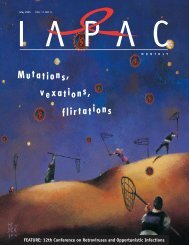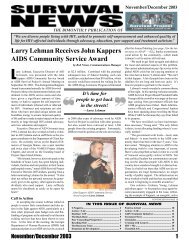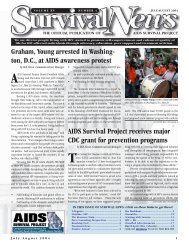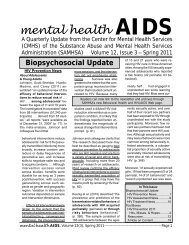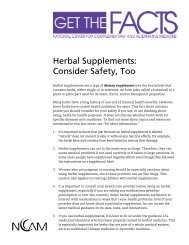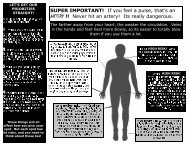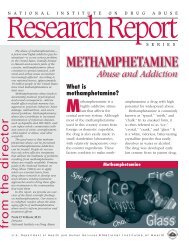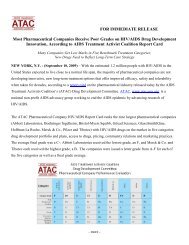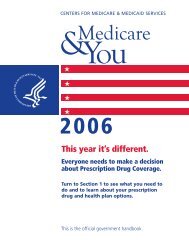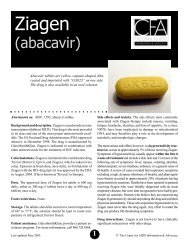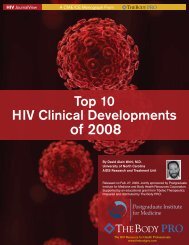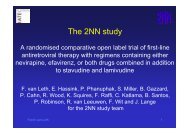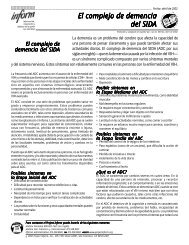Briefly - CD8 T cells - The Body
Briefly - CD8 T cells - The Body
Briefly - CD8 T cells - The Body
Create successful ePaper yourself
Turn your PDF publications into a flip-book with our unique Google optimized e-Paper software.
Depressive disorders are frequently difficult to diagnose because<br />
their broad cluster of symptoms can also occur as a result of HIV itself,<br />
opportunistic infections, or co-morbidities such as hepatitis C.<br />
renewed compassion not only for themselves<br />
but for others as well.<br />
aDjusting to a new<br />
Diagnosis of hiV/aiDs<br />
Learning that you are HIV-positive is a<br />
life-changing moment. Anyone who has<br />
had this experience remembers the exact<br />
circumstances and their emotional and<br />
physical reactions trying to comprehend<br />
and assimilate this news. A lifetime of<br />
prior events guides our subconscious<br />
response at that moment of emotional<br />
shock. Reactions can include tears, inappropriate<br />
laughter, a flattening of affect<br />
(feelings or emotions expressed by<br />
physical gestures and body language),<br />
relief (“I knew this was coming”), or total<br />
numbing of feelings. At first, some people<br />
may be unable to comprehend the news<br />
(“that’s impossible”), while others, such as<br />
Angela mentioned above, may experience<br />
a reawakening of prior trauma. Anyone<br />
in this position is vulnerable and requires<br />
emotional support. Rash decisions should<br />
be discouraged and assistance should be<br />
offered to enable any emerging feelings to<br />
be identified and expressed.<br />
Assimilating this shock is a process of<br />
acceptance that varies with each individual.<br />
Feelings such as sadness, anger, or fear<br />
are completely normal, even if delayed.<br />
This is identified by the Diagnostic and<br />
Statistical Manual IV-TR (the standard set<br />
of guidelines published by the American<br />
Psychiatric Association) as an “Adjustment<br />
Disorder.” <strong>The</strong>re is no way to predict who<br />
might develop such a reaction, which is<br />
diagnosed through a variety of symptoms<br />
such as depressed mood, physical complaints,<br />
and agitation. Such adjustment<br />
reactions typically do not last longer<br />
than six months, although in the case of a<br />
chronic illness such as HIV/AIDS, the duration<br />
may vary. Supportive psychotherapy,<br />
including expression of feelings and assisting<br />
in the identification and creation of<br />
a support system, is usually sufficient to<br />
resolve an adjustment disorder and early<br />
intervention can prevent the development<br />
of more significant anxiety and depressive<br />
problems.<br />
common mental health issues<br />
associateD with hiV<br />
A variety of mental health problems can<br />
be experienced by people living with HIV/<br />
AIDS. <strong>The</strong> following section describes the<br />
more typical diagnostic categories and<br />
their associated interventions.<br />
Neurologic complications of HIV—<br />
While antiretroviral therapies have greatly<br />
reduced their prevalence, more than half<br />
of HIV-positive patients do experience<br />
some form of neurologic dysfunction<br />
ranging from mild to very severe. 1 <strong>The</strong><br />
most typical of these disorders is MCMD<br />
(minor cognitive motor disorder), characterized<br />
by mild impairment which may<br />
totally escape detection. MCMD does<br />
not necessarily progress to dementia. A<br />
more serious form is HAD (HIV-associated<br />
dementia), which includes cognitive dysfunction<br />
(problems with concentration,<br />
memory, and attention), declining motor<br />
performance (strength, dexterity, coordination),<br />
and behavioral changes. Both<br />
MCMD and HAD are diagnoses of exclusion,<br />
meaning other potential causes such<br />
as substance abuse or medication must be<br />
ruled out. Recent studies indicate that the<br />
risk of dementia related to cerebral atrophy<br />
may be associated with the CD4 nadir<br />
(the lowest point) rather than current CD4<br />
levels. 2 While there are no specific treatments,<br />
antiretroviral therapy along with<br />
other interventions, such as structured<br />
routines, memory aids, and good nutrition,<br />
may greatly reduce symptoms. 3 Other<br />
HIV-related neurologic disorders include<br />
encephalitis, meningitis, neuropathy, and<br />
the very rare but lethal PML (progressive<br />
multifocal leukoencephalopathy).<br />
Mood disorders—<br />
Mood disorders, or conditions that affect<br />
an individual’s mood, include those that<br />
result in depressive symptoms (major<br />
depressive disorder and dysthymia) and<br />
those with intermittent mania which can<br />
be frequently accompanied by a depressive<br />
phase (bipolar disorder). Depressive<br />
disorders are one of the most common<br />
mental health concerns among HIV<br />
patients. While they can appear or become<br />
more severe following an HIV diagnosis,<br />
symptoms can increase at any time due to<br />
medical complications, loss of a loved one,<br />
or other psychosocial stressors. Certain<br />
subgroups of individuals living with HIV<br />
are at greater risk for mood disorders.<br />
Major depressive disorder, for example,<br />
occurs more frequently in substance abusers,<br />
4 older patients, 5 and females with a<br />
history of abuse (as in the case of Angela<br />
noted above). 6<br />
Major depressive disorder (MDD) creates<br />
a pervasive low mood which inhibits<br />
the ability to experience pleasure. It<br />
has a prevalence as high as 36% among<br />
individuals living with HIV. 7 People experiencing<br />
depression may be preoccupied<br />
with thoughts or feelings of worthlessness,<br />
regret, hopelessness, and despair. A<br />
second, milder type of depression called<br />
dysthymia, in which symptoms are chronic<br />
but less severe than with major depressive<br />
disorder, is also prevalent.<br />
Depressive disorders are frequently<br />
difficult to diagnose because their<br />
broad cluster of symptoms (increased<br />
or decreased sleep and/or appetite, low<br />
mood, low energy, etc.) can also occur as<br />
a result of HIV itself, various opportunistic<br />
infections, or co-morbidities such as hepatitis<br />
C. If undiagnosed, major depressive<br />
disorder can lead either to an increased<br />
risk of HIV transmission, or among those<br />
already positive, a lack of adherence to<br />
HIV medication regimens or relapse of<br />
substance abuse.<br />
Suicide is a serious risk for someone<br />
experiencing ongoing MDD and any<br />
suicidal thoughts and/or plan must be<br />
immediately addressed. In one recent<br />
study, 26% of people with HIV reported<br />
suicidal thoughts at some time in their life,<br />
and 13% reported a suicide attempt. Those<br />
who attempted suicide were more likely<br />
40 | N O V E M B E R + D E C E M B E R 2 0 1 1 P O s i t i V E lyAwA R E . C O M


